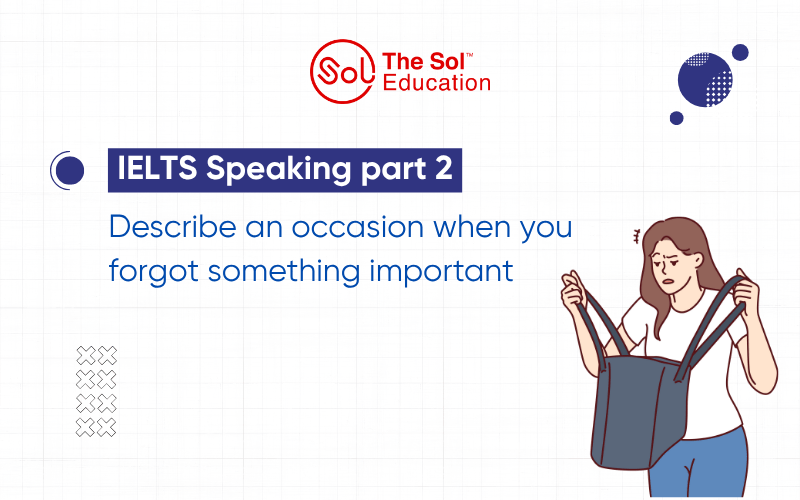Describe an occasion when you forgot something important
You should say:

Nếu bạn chưa nghĩ ra mình sẽ nói gì thì nghía qua một vài gợi ý mà SOL chia sẻ dưới đây nha:
Forgot a school assignment (Quên bài tập về nhà): Missed submitting an important project (Quên nộp một dự án quan trọng)
Forgot a friend’s birthday (Quên sinh nhật bạn): Didn’t call or send a gift (Không gọi điện hoặc gửi quà)
Forgot an exam date (Quên ngày thi): Missed a test at school (Bỏ lỡ một bài kiểm tra ở trường)
Busy with other tasks (Bận rộn với các việc khác): Had too many things to do (Có quá nhiều việc phải làm)
Didn’t write it down (Không ghi chú lại): Forgot to note it in a planner (Quên ghi vào sổ tay)
Last month/year (Tháng trước/năm ngoái): A recent or memorable event (Một sự kiện gần đây hoặc đáng nhớ)
Felt embarrassed (Cảm thấy xấu hổ): Worried about disappointing someone (Lo lắng vì làm ai đó thất vọng)
Felt frustrated (Cảm thấy bực bội): Angry at oneself for forgetting (Tức giận với bản thân vì đã quên)
I’d like to talk about a time when I forgot an important school assignment. It was a project for my English class, and I had to submit it last semester. The teacher asked us to write an essay, and it was worth a big part of our grade.
I forgot about it because I was very busy with other subjects. I had exams and other homework, so I didn’t write it down in my notebook. Also, I think I was a bit careless because I thought I would remember it, but I didn’t. It happened about three months ago, when the deadline came, and I realized I hadn’t done it.
When I found out, I felt really bad. I was embarrassed because I had to tell my teacher, and I was worried about my grade. I felt frustrated with myself for being so forgetful. After that, I tried to be more organized and use a planner to avoid this problem again.
Từ vựng IELTS hữu ích:
assignment /əˈsaɪnmənt/: bài tập
submit /səbˈmɪt/: nộp
deadline /ˈdedlaɪn/: hạn chót
careless /ˈkeələs/: bất cẩn
embarrassed /ɪmˈbærəst/: xấu hổ
organized /ˈɔːɡənaɪzd/: có tổ chức
Let me share a time when I forgot something really important, which was my best friend’s birthday. It was supposed to be a special day because it was her 18th birthday, a big milestone. I had planned to call her and send a thoughtful gift, but somehow, it completely slipped my mind.
The reason I forgot was probably because I was swamped with schoolwork at the time. It happened about six months ago, during a hectic week filled with exams and group projects. I didn’t jot it down in my calendar, which was a big mistake, as I usually rely on reminders to keep track of important dates. By the time I realized it, the day had already passed.
I felt absolutely awful when I remembered. A wave of guilt washed over me because I knew how much it meant to her, and I hated the thought of letting her down. I immediately called to apologize and made up for it by planning a belated celebration, but the experience taught me a valuable lesson about staying organized. Since then, I’ve been much more diligent about using a planner to avoid such slip-ups.
Từ vựng IELTS hữu ích:
milestone /ˈmaɪlstəʊn/: cột mốc
slipped my mind /slɪpt maɪ maɪnd/: quên mất
swamped /swɒmpt/: ngập đầu
hectic /ˈhektɪk/: bận rộn
jot it down /dʒɒt ɪt daʊn/: ghi chú lại
a wave of guilt /ə weɪv əv ɡɪlt/: cảm giác tội lỗi
diligent /ˈdɪlɪdʒənt/: chăm chỉ
slip-ups /ˈslɪp ʌps/: sai sót
Sample Answer 1: Band 6.0–6.5
I think people often forget small things, like where they put their keys or phone. Also, they might forget appointments or meetings if they don’t write them down. Another thing is forgetting names of people they just met. These things happen because people are busy or not paying attention.
Từ vựng IELTS hữu ích:
appointments /əˈpɔɪntmənts/: cuộc hẹn
paying attention /ˈpeɪɪŋ əˈtenʃn/: chú ý
Sample Answer 2: Band 7.5–8.0+
People tend to forget everyday items or tasks quite easily, such as misplacing their keys, wallets, or glasses. Additionally, appointments or deadlines can slip through the cracks if they’re not recorded. Forgetting names, especially after a brief introduction, is also common. These lapses often occur due to distractions, multitasking, or simply not prioritizing the information at the time.
Từ vựng IELTS hữu ích:
misplacing /mɪsˈpleɪsɪŋ/: để lạc
slip through the cracks /slɪp θruː ðə kræks/: bị bỏ sót
lapses /ˈlæpsɪz/: sự quên lãng
multitasking /ˈmʌltiˌtæskɪŋ/: làm nhiều việc cùng lúc
Sample Answer 1: Band 6.0–6.5
Some people find it hard to remember things because they have a lot of stress. When they are busy or worried, it’s difficult to focus. Also, if they don’t sleep well, their brain doesn’t work properly. Another reason is that some people don’t use tools like notes or calendars to help them.
Từ vựng IELTS hữu ích:
stress /stres/: căng thẳng
focus /ˈfəʊkəs/: tập trung
Sample Answer 2: Band 7.5–8.0+
For some individuals, remembering things can be challenging due to various factors. High levels of stress or anxiety can impair concentration, making it harder to retain information. Lack of sleep also plays a significant role, as it affects cognitive functions like memory. Additionally, some people may not use effective strategies, such as note-taking or digital reminders, which can exacerbate forgetfulness, especially when juggling multiple responsibilities.
Từ vựng IELTS hữu ích:
impair /ɪmˈpeə/: làm suy yếu
retain /rɪˈteɪn/: giữ lại
cognitive functions /ˈkɒɡnɪtɪv ˈfʌŋkʃnz/: chức năng nhận thức
exacerbate /ɪɡˈzæsəbeɪt/: làm trầm trọng hơn
juggling /ˈdʒʌɡlɪŋ/: xoay xở
Sample Answer 1: Band 6.0–6.5
I think older people are sometimes more forgetful because their memory is not as good as young people. Also, people who are very busy, like students or workers, can forget things because they have too many tasks. Some people who don’t care about details might also forget things easily.
Từ vựng IELTS hữu ích:
older people /ˈəʊldə ˈpiːpl/: người lớn tuổi
tasks /tæsks/: nhiệm vụ
Sample Answer 2: Band 7.5–8.0+
Certain groups may be more prone to forgetfulness. For instance, elderly individuals often experience memory decline as a natural part of aging. Similarly, people with demanding schedules, such as students or professionals, might overlook things due to mental overload. Additionally, those who are naturally disorganized or less attentive to details may struggle to recall information, as they don’t prioritize memory aids or structured routines.
Từ vựng IELTS hữu ích:
prone to /prəʊn tə/: dễ bị
memory decline /ˈmeməri dɪˈklaɪn/: suy giảm trí nhớ
mental overload /ˈmentl ˈəʊvələʊd/: quá tải tinh thần
memory aids /ˈmeməri eɪdz/: công cụ hỗ trợ trí nhớ
Sample Answer 1: Band 6.0–6.5
People can improve their memory by sleeping well because it helps the brain work better. Also, they can write things down, like using a notebook or phone app, to remember tasks. Another way is to practice, like playing memory games or repeating information. Eating healthy food is also good for memory.
Từ vựng IELTS hữu ích:
sleeping well /ˈsliːpɪŋ wel/: ngủ ngon
healthy food /ˈhelθi fuːd/: thức ăn lành mạnh
Sample Answer 2: Band 7.5–8.0+
To enhance their memory, people can adopt several practical strategies. Getting adequate sleep is crucial, as it allows the brain to process and store information effectively. Using organizational tools, such as planners or digital apps, can help keep track of tasks and deadlines. Additionally, engaging in mental exercises like puzzles, reading, or mnemonic techniques can sharpen recall. A balanced diet rich in nutrients, particularly those supporting brain health, also contributes significantly to better memory.
Từ vựng IELTS hữu ích:
enhance /ɪnˈhæns/: cải thiện
adequate /ˈædɪkwət/: đủ
mnemonic techniques /nɪˈmɒnɪk tekˈniːks/: kỹ thuật ghi nhớ
sharpen /ˈʃɑːpən/: làm sắc bén
Sample Answer 1: Band 6.0–6.5
I think some people have better memory because they are young and their brain is strong. Also, people who practice remembering things, like students who study a lot, have good memory. Some people might be born with better memory, but I’m not sure. Lifestyle, like sleeping and eating well, also helps.
Từ vựng IELTS hữu ích:
strong /strɒŋ/: mạnh mẽ
lifestyle /ˈlaɪfstaɪl/: lối sống
Sample Answer 2: Band 7.5–8.0+
Several factors explain why some individuals have superior memory. Genetics likely play a role, as some people may inherit cognitive traits that enhance memory capacity. Additionally, lifestyle choices, such as regular exercise, sufficient sleep, and a nutritious diet, significantly boost brain function. People who frequently engage in intellectually stimulating activities, like studying or solving complex problems, also tend to develop stronger memory skills. Moreover, effective use of memory strategies, such as visualization or repetition, can give certain individuals an edge.
Từ vựng IELTS hữu ích:
superior /suːˈpɪəriə/: vượt trội
cognitive traits /ˈkɒɡnɪtɪv treɪts/: đặc điểm nhận thức
intellectually stimulating /ˌɪntəˈlektʃuəli ˈstɪmjuleɪtɪŋ/: kích thích trí tuệ
give an edge /ɡɪv ən edʒ/: tạo lợi thế
Sample Answer 1: Band 6.0–6.5
I think using calendars is a good idea. It helps people remember important things, like meetings or birthdays, so they don’t forget. It’s very useful for busy people because they have many tasks. I use a calendar on my phone, and it makes my life easier.
Từ vựng IELTS hữu ích:
remind /rɪˈmaɪnd/: nhắc nhở
makes my life easier /meɪks maɪ laɪf ˈiːziə/: làm cuộc sống dễ dàng hơn
Sample Answer 2: Band 7.5–8.0+
I view the use of calendars as a highly effective tool for managing daily life. They provide a reliable way to keep track of commitments, from work deadlines to personal events like anniversaries, which is especially helpful for those with packed schedules. Digital calendars, in particular, offer added convenience with features like notifications and synchronization across devices. Personally, I find them indispensable for staying organized, and I think they reflect a proactive approach to time management.
Từ vựng IELTS hữu ích:
commitments /kəˈmɪtmənts/: cam kết
packed schedules /pækt ˈʃedjuːlz/: lịch trình bận rộn
indispensable /ˌɪndɪˈspensəbl/: không thể thiếu
proactive /prəʊˈæktɪv/: chủ động
